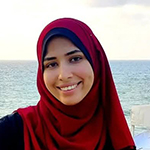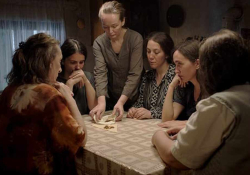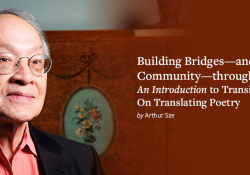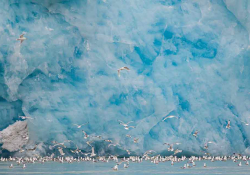They Call It Displacement—In Reality, It’s Hell (This Is My Story)
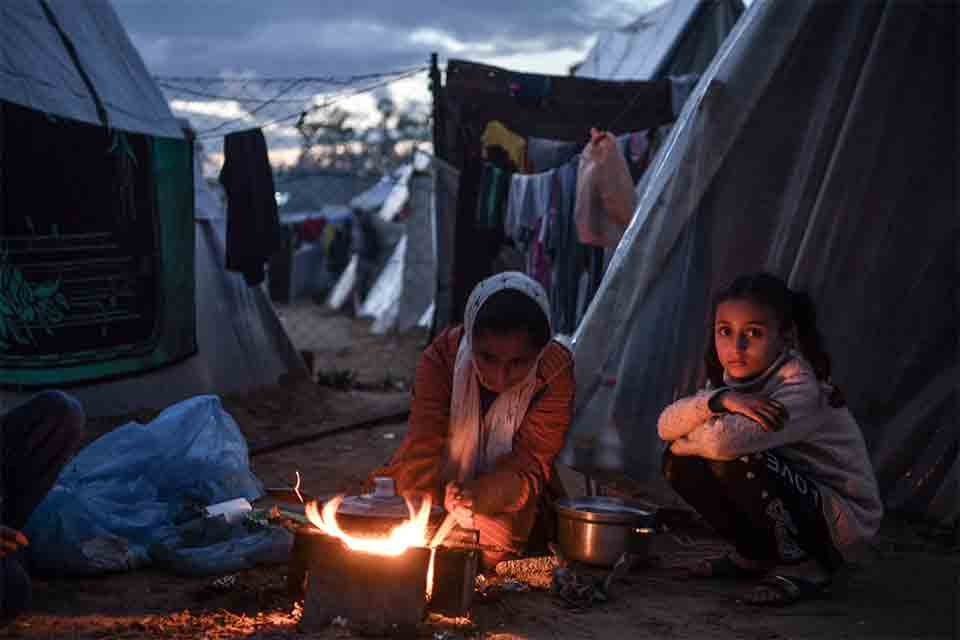
A writer in the Jabalia camp in northern Gaza contemplates the many losses across multiple displacements and what the destruction wrought on Gaza says about the nature of this world.
This is the sixty-seventh day of the invasion of the Jabalia camp in northern Gaza. The day it began, the camp was declared a military zone, and the IMF laid total siege to it from all sides. Its entryways and exits were closed off to everyone living there.
As I record these words, I’m seated on a bed belonging to a girl I don’t know. Judging from the pink décor and the makeup on the dressing table, I conclude that the room must belong to a girl. The once-colorful containers of makeup are layered with the dust of abandonment and the fine grit that comes pouring in from shells and the rubble of adjacent houses. It’s an elegant room, but it’s lost its luster. And even though I’m a girl too, I haven’t been taken with it yet. After all, I’m not the girl for whom its every corner was designed.
It makes me sad that she left all this beauty behind and went south, driven by threats, murder, fire belts,* executions, and forced displacement. She and her family might be living in a tent now, and for all I know, the tent’s stakes have given way before a storm wind’s violent force, bringing the tent crashing down on their heads as they sleep, or possibly while they’re awake, or as they cry or maybe even laugh at their situation. Or they might have been invaded by swarms of mice or other rodents, and all sorts of bugs, some you might be familiar with and some you’ve only had the honor of meeting thanks to the war. Dogs might bark at their tent door in the middle of the night and wake them out of some nice dream they had managed to snatch out of time’s clutches despite the never-ending news of massacres, martyred and wounded, shortages of fuel, gas, and firewood, hospitals going out of service, the scarcity of water, and the endless lines outside the outhouses in the camps created by the war. Camps were only made for Palestinians, whose every generation faces a new Nakba bloodier than the one that preceded it. Wherever Palestinians go, they’re followed by a tent, if not in material reality, then in their imaginations, as they wander lost along roads that lie in wait for them for no reason but that they are Palestinian!
As for the makeup that fills your room, my lovely girl, don’t worry about it. It will wait for you until you get back and we recover our right to life. However, it won’t be able to beautify ashen faces and dull eyes. It might cover up the blotches on our faces and hands caused by constant exposure to fire, but it won’t be able to conceal the exhaustion, the rage and frustration, the suffering, or the scars that have turned our once-bright features into wrinkles on our skin, our hearts, and our memories. And as for your stylish clothes, could wearing them lend any luster to worn-out bodies enervated by hunger, forced displacement, and backbreaking work? I assure you, my unnamed girl: I’ll hold your life for you until you can come back to claim it.
I assure you, my unnamed girl: I’ll hold your life for you until you can come back to claim it.
More than a year has passed since this war broke out. During that time, fire has become a central part of our daily lives. It substitutes for the propane gas the colonizers refuse to allow into the strip despite the fact that it belongs to us, having been extracted from the gas fields off our own shores. And it isn’t the only resource the colonizers steal. If they could, our colonizers would deprive us of air itself. Barring that, they do their best to pollute it with their rockets, smoke bombs, incendiary bombs, and aircraft, which fly over us every moment of the day and night, displaying their lethal power over an unarmed people whose only experience of life is that of occupation, colonization, and their brutality. In the end, the worst pollutant of our air and our lives is the foul-smelling breath of the colonizers who occupy our homeland.
My name is Nour, I’m from the Jabalia refugee camp, and I’ve been displaced now more times than I can count. I stopped counting when we lost our ability to flee from death to the hell of life. I ask myself: Wouldn’t death be better than this absurdity we’re living through? If the answer is yes (which it is), then why do we flee from this specter that’s taken up residence in Gaza, robbing it of everything beautiful for over a year? And my reply is: We don’t flee from death as an idea but from the hideous form it’s now taken. We fear being trapped under the rubble, fighting off death, and calling for help without anyone answering. We fear dying a thousand times before we die: a repeated scenario to which most of the living and the dead in Gaza have been subjected. A house is brought down on the heads of its inhabitants by a massive bomb. At first, the screams of the survivors can be clearly heard. But little by little, they grow fainter and fainter, eventually becoming groans, then dying breaths. Then they fall silent, and the place is filled with the stench of death. A temporary lone survivor may begin engaging with the organs and limbs scattered around her. She inhales the smoke of the rockets and, with it, the odor of her family members’ shed blood. She is the sole witness to the catastrophe, forced to listen to their death rattles and ponder their fixed stares. She witnesses their deaths one at a time until her own turn comes, whereupon she exhales her spirit as though she were retching up the life that failed to protect her right to die in peace.
We fear dying a thousand times before we die.
Do you suppose this is the worst of the sufferings? Far from it. Imagine being under the rubble with shrapnel gouging into your body and your wounds bleeding profusely, yet without death coming to your rescue. Instead, it keeps you at arm’s length. Curses! You see efforts being made to rescue you, but they all end in failure. So, you have no option but to surrender, prostrate under the rubble, until death takes pity on you and spirits you away. Do you understand now why we flee from death in Gaza?!
My family and I were displaced to Hayy al-Nasr in western Gaza on October 6, 2024, that is, after one full year of the war. The day after the Jabalia camp was declared a military zone for the third time, we left against our will, as usual, under a barrage of random and deadly rocket fire. We left to save the children. We left for fear of the savagery, for fear of being wounded without there being any ambulance services, and for fear of capture and abuse.
By this time, scenes of displacement had become a familiar sight to us: thousands of families marching down a path that had been marked out for them by the colonizing army, their faces wan, their steps unsteady; children crying from having to walk such distances, men muttering curses under their breath, and women weighed down with heavy loads. Pockets were generally empty, and taxi drivers had begun exploiting people’s need by hiking their fares sky-high; the people’s destination was unknown, and their eyes betrayed their sense of lostness. They had grown accustomed to this ordeal: the ordeal of having to spend all night on the city streets in the pouring rain, spreading out on the ground with nothing but the sky for a blanket, then having to march along under the sun’s scorching rays; the ordeal of being displaced under shellfire and rocket fire with shrapnel flying every which way, and not expecting everyone to make it through the gauntlet unscathed.
Every time you’re displaced, the bag you bring with you gets smaller. Little by little, as time goes by, you give up everything, since you’re constantly being forced to choose between what’s more and less important. On the other hand, your right to choose was lost to you in the first decision that was made on your behalf, such as the decision to declare war, for example, or the decision to bring the course of your life to a halt, then wipe it out of existence and doom you to annihilation. Human beings aren’t given any choice in war. Individuals spend their days scattered and fleeing, with death in front of them, behind them, to their left and to their right. Whichever destination you choose, you’ll lose a part of yourself: your son, your daughter, your sister, your brother, nephews, nieces. Inevitably, you’ll see one of your loved ones go to the grave. Loss is something unavoidable, an inseparable part of your experience as long as war refuses to breathe its last, hissing, “Give me more, more!”
Every time displacement knocks on our door, I wonder: How can we reduce a household to a suitcase? Aren’t we living in the age of development and progress? Couldn’t some kind of artificial intelligence resolve this dilemma for us? But what intelligence am I talking about? If the civilized world felt the slightest concern for us, would this genocide have gone on for more than a year? I pose the questions, and reality replies, “The war has exposed the pretense of so-called civilization. What brings people together isn’t ‘humanity,’ as they used to claim without foundation, but unvarnished ‘interests.’”
When the colonizers perpetrate hideous massacres against tens of thousands of children and women while the whole world looks on without lifting a finger, this augurs an unfathomable catastrophe, one that inspires my rage and pity for this world that clings to the laws of “balances of power,” failed balances governed by the powerful and clung to by the servile and weak. If there are those who, in response to political dictates, are willing to close their eyes to the shredded remains of a little girl who was butchered by Israeli warplanes as she stood in line to receive some biscuits, then I say: to hell with politics, and cursed be their “interests.” What you close your eyes to today will slap you in the face tomorrow, because the colonizers’ thirst for blood knows no bounds, and they won’t be content to destroy us alone. Their bank of targets is large, and their kill list never-ending.
And because one calamity recalls another, the calamity of displacement teaches you one thing—namely, that everything is dispensable in the end if dispensing with it is the only way to survive. That includes the clothes you came across only after a lengthy search, which you finally managed to afford despite their exorbitant prices, and which you were overjoyed to find after having lost everything you had when your house was bombed. Even these will end up being a burden in the event that you decide to take them with you. If the distance you have to travel is very long, you’ll abandon them along the way without hesitation just as so many displaced folks have done, casting off their dust-covered effects alongside the potholed, bombed-out streets and pathways. Their hands let go of once-prized acquisitions, their children’s clothes, and the food they brought from home, even as their eyes weep at the sight. After all, those who abandon such treasures know what awaits them: scarcity, exorbitant prices, humiliation, degradation, exhaustion, and the rage born of helplessness in the face of injustice. However, the road is full of deadly perils; the rubble is riddled with sharp edges that cut and wound; the body’s strength gives out, and the only thing that can be rescued is one’s soul. The soul itself may be hollowed out, maimed, and marginalized; nevertheless, it remains the seat of the instinct to survive—and again, to survive—despite the absence of life and the abundance of surrounding death.
The soul itself may be hollowed out, maimed, and marginalized; nevertheless, it remains the seat of the instinct to survive.
When, after a bitter trek born of displacement, we reached Hayy al-Nasr, I expected us to be received by the warm hospitality of this neighborhood, which had always been brimming with vitality. The embodiment of beauty in the city, Hayy al-Nasr had pulsated with energy and refinement. Instead, we were met by a sight that crushed our expectations. We were dumbfounded by the sheer horror of what we saw. It was as though the neighborhood had been hit by a devastating earthquake that had swallowed up every last vestige of beauty, leaving nothing but ruin in its wake. Soaring towers had been reduced to piles of rubble. Entire city blocks had been bombed out, neighborhoods bulldozed and left a charred ruin, and vehicles turned to skeletons of iron at the entrances to destroyed homes. Shops, commercial centers, and all manifestations of life had been demolished, while the city’s façade had been disfigured beyond recognition: devoid of its inhabitants, stripped naked of its landmarks, emptied of its spirit. This heinous crime revived a question that had long occupied my mind, knocking on the doors of logic in search of a persuasive answer: “What did we sow to reap all this destruction?”
How many years had we spent laboring and building, beautifying and making memories, commemorating dates?
When you walk through the neighborhoods of the disaster-stricken city, you summon memories of its lost merriment, and when you see its incinerated vehicles, you think of all the cars that once passed this way carrying newlyweds dreaming of rosy futures to the beating of drums and the tunes of reed pipes. It was here that tears were shed, some for grief, others for joy, and that stories were begun and brought to their conclusions.
Then suddenly, in the span of a single year, we find ourselves hemmed in on all sides by random forces of death and destruction. The colonizers’ aircraft have murdered the newlyweds, buried their rosy dreams, and demolished their cozy abode. The sight of this destruction is even harmful to one’s vision; it wounds the eyes with its crudity. We ask ourselves how this could have happened. Who could possibly have allowed this?
Scores of disturbing questions swarm through our heads, but we find no answers. So, then, given that we’ve reaped all these catastrophes, we have to change something in our phrasing of the question. And the question becomes: What is the true nature of this world we live in?
Translation from the Arabic
*“Fire belts” (al-aḥzima al-nāriyya) is a term used to refer to the massive air strikes with which the Israeli military pounds the Gaza Strip, leveling entire blocks at a time.

